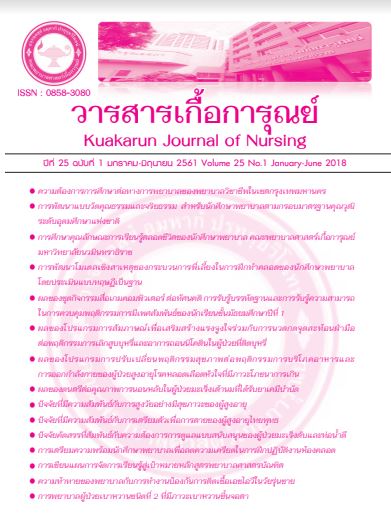การเขียนแผนการจัดการเรียนรู้สู่เป้าหมายหลักสูตร พยาบาลศาสตรบัณฑิต
คำสำคัญ:
พยาบาลศาสตร์, แผนการจัดการเรียนรู้, กรอบมาตรฐานคุณวุฒิระดับอุดมศึกษาแห่งชาติบทคัดย่อ
กระทรวงศึกษาธิการได้ประกาศกรอบมาตรฐานคุณวุฒิระดับอุดมศึกษาแห่งชาติ พ.ศ. 2552 และได้บรรจุมาตรฐานผลการเรียนรู้ของนักศึกษา/บัณฑิตเป็นสำคัญ โดยบัณฑิต
ทุกสาขา/สาขาวิชาต้องมีมาตรฐานผลการเรียนรู้ 5 ด้านเป็นอย่างน้อยได้แก่ 1) ด้านคุณธรรม จริยธรรม 2) ด้านความรู้ 3) ด้านทักษะทางปัญญา 4) ด้านทักษะความสัมพันธ์ระหว่างบุคคล และความรับผิดชอบ 5) ด้านทักษะการวิเคราะห์เชิงตัวเลข การสื่อสารและการใช้เทคโนโลยีสารสนเทศ สำหรับสาขาพยาบาลศาสตร์เป็นสาขาที่เน้นทักษะการปฏิบัติจึงเพิ่มมาตรฐานผลการเรียนรู้ด้านทักษะพิสัยไว้ในหลักสูตร เนื้อหาทางการพยาบาลที่ได้กำหนดขึ้นในหลักสูตร ถูกนำไปถ่ายทอดสู่ผู้เรียนผ่านการจัดการเรียนการสอนที่หลากหลายและเหมาะสมกับรายวิชา ทั้งภาคทฤษฎีและภาคปฏิบัติโดยมีจุดมุ่งหมายเพื่อให้บรรลุเป้าหมายของผลการเรียนรู้ ทั้ง 6 ด้าน การจัดการเรียนการสอนดังกล่าวจำเป็นต้องมีการเขียนแผนการจัดการเรียนรู้ ซึ่งคล้ายกับการเขียนแผนที่ที่แสดงทิศทางไปสู่เป้าหมายแผนการจัดการเรียนรู้ประกอบด้วย 1) สาระสำคัญหรือสังเขปหัวข้อ 2) จุดประสงค์การเรียนรู้ 3) หลักฐานการเรียนรู้ 4) จุดประสงค์เชิงพฤติกรรม 5) เนื้อหาวิชาหรือสาระการเรียนรู้ 6) กิจกรรมการเรียนรู้หรือกิจกรรมการเรียนการสอน 7) สื่อการเรียนการสอน 8) การวัดและประเมินผล และ 9)บันทึกหลังการจัดการเรียนรู้ แผนการจัดการเรียนรู้คือเครื่องมือซึ่งจะมีประสิทธิภาพได้ถ้ามีการนำไปใช้ในการจัดการเรียนการสอนอย่างถูกวิธีเพื่อให้การเรียนการสอนเป็นไปตามที่ต้องการและบรรลุเป้าหมายของหลักสูตร ทำให้ได้บัณฑิตพยาบาลที่มีมาตรฐานผลการเรียนรู้ครบทั้ง 6 ด้าน สามารถดำเนินชีวิตที่ถูกต้อง ทำหน้าที่ของตนเองต่อชีวิตของตนเองและต่อสังคมตามเป้าหมายของการศึกษาอย่างแท้จริง

















